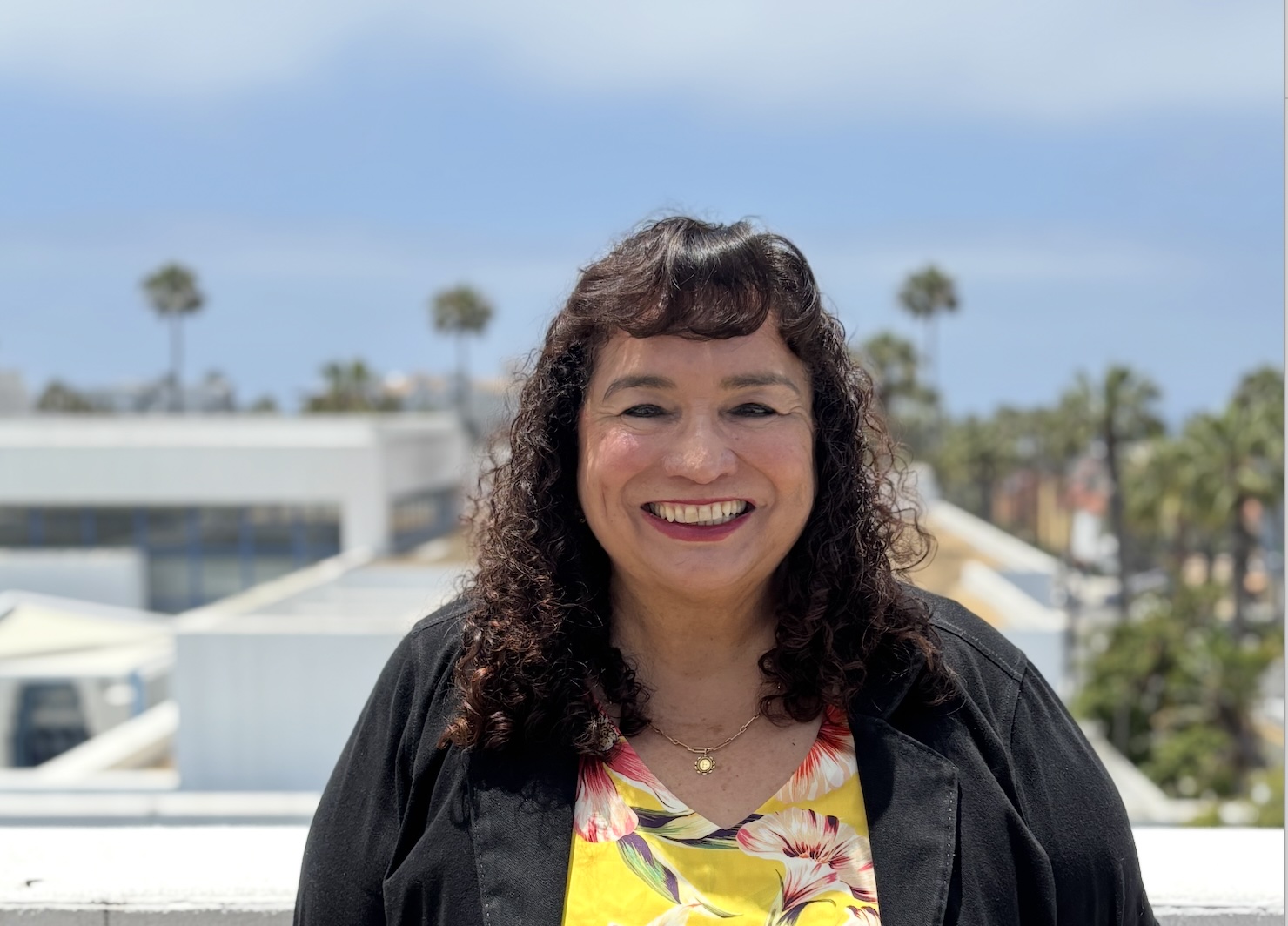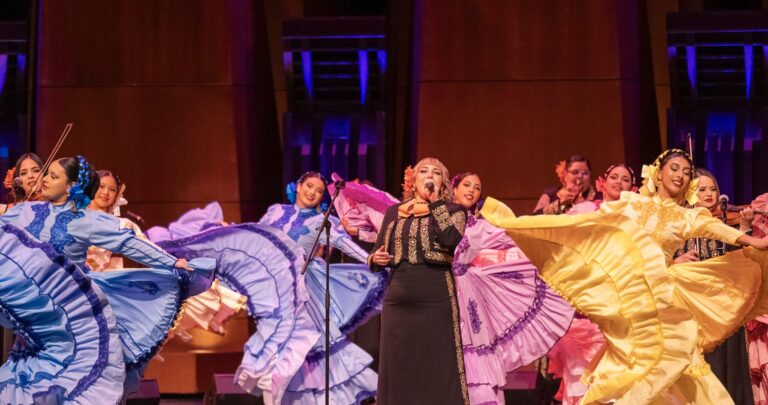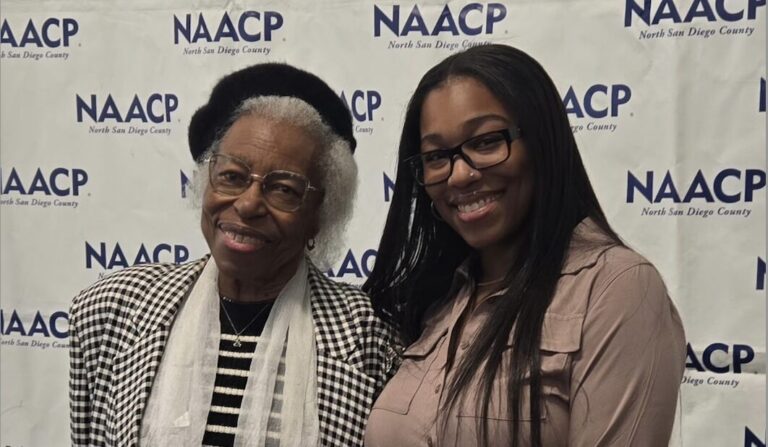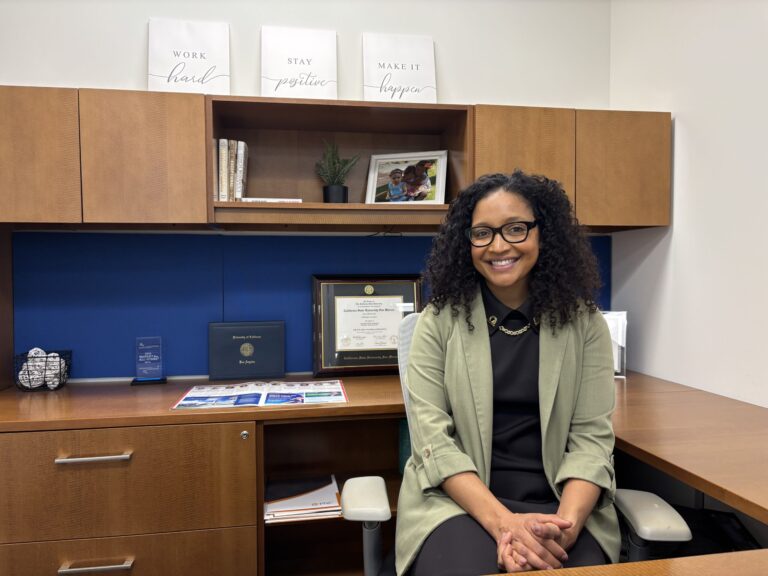By Melanie Slone
“You never know ‘til you try,” says Mayor Esther C. Sanchez, the first woman and first person of Latino descent to be mayor of Oceanside. Leaving home young, overcoming an assault, fighting for people’s rights—especially for Latinos—, and eventually returning home to be elected as mayor, she’s lived up to her words.
Mayor Sanchez grew up in the multifaceted Oceanside community of Eastside. “My mom worked at a rubber factory in San Clemente, and my dad worked on base…What they wanted was to have a home. And they really put a lot of effort into that.”
Sanchez’s second-grade teacher told her father his daughter would be going to college someday, words she carried with her. Her mom also believed in the power of education, having been homeless as a child and only done one year of elementary school in Tijuana.
Her mother’s stories of survival inspired her, as did the belief she could achieve whatever she wanted. She got a scholarship to Brown University, in Providence, Rhode Island, clear across the country.
“I would listen to the stories from my uncle of the Mexican Revolution, Pancho Villa and all that,” she says. But going to Brown, where there were very few Latinos, made her realize she needed to learn about who she was.

“I’m not Going to Let That Happen!”
Mayor Sanchez calls her days at Brown “the best of times, the worst of times, because I learned a whole lot of lessons the hard way.” She credits those years with showing her “what was important,” including working with the United Farm Workers and Movimiento Estudiantil Chicano de Aztlán (MEChA) and interning in the Senate in Washington, DC. But the environment was challenging.
When she suffered an assault, she took some time off to recover emotionally. “There are doubts that you have,” she says, “thinking that I wasn’t smart enough, good enough.”
She would eventually become an avid public defender, after attending Hastings Law School in San Francisco, today UC San Francisco Law School, through the Legal Education Opportunity Program (LEOP). “There were a lot of Latino students, Chicano students, whereas as at Brown, there were five of us in the school of 5000.”
Her time at Hastings put her in touch with politics again. She worked on political campaigns and tried to educate people about politics.
When it was time to take the bar to become a lawyer in California, she says, people told her Latinos never passed it on the first try. “And I thought, well, I’m not going to let that happen!”
After passing on her first attempt, she returned to San Diego County, where she joined La Raza Lawyers in Chula Vista. By 1998, she was chair of the group. “We started this whole movement…working to improve lives in Latino communities.”
At the end of her term as chair, she decided to run for office. “By then they had the term limits in Sacramento,” she says. “All of a sudden, there are people in Sacramento who look just like me… So, I thought, I should run for something.”
When she announced her candidacy for city council in her hometown of Oceanside, “People were saying, you’re not going to win,” she says. “You’re brown… I don’t think anybody thought I was going to win.”
But she was determined. “I felt I needed to go back home because it was like the belly of the beast… a lot more civil-rights issues” than in south San Diego County. She was a public defender, making her bid even more complicated.
Yet, having worked on countless campaigns for other candidates, she knew how to gather momentum. Plus, she was coming home. At the time, the Manchester Project, a twelve-story, 475-room hotel, planned to privatize the beach and maybe even the pier. “I grew up in the City of Oceanside,” she says. “I fished off the pier with my grandfather and my dad and my brothers. There was no way I wanted to let anything like that happen.”
The community she remembered was one that cared about each other. Her family used to organize community efforts, helping Lucy Chavez, the second woman and first Latina elected to the Oceanside City Council in 1976. Chavez grew up in Eastside and started her career as an activist for the residents of the area, establishing schools and parks and fighting for water, sewage, and paved roads. “I knew that I would be standing on her shoulders if I made it,” says Mayor Sanchez.
There were 15 people running for city council that year. She won a seat.

The Issues
A first important issue for her as a councilmember was to build a second senior center. El Corazon was part of that, with a long-term vision for parks, habitat, civic services, and other uses. “I thought, if we do a senior center at El Corazon, that’ll get the park started.” The project is still underway today, with a groundbreaking for sports fields coming soon.
Another important issue was community development block grant (CDBG) program funding. “At the very least I wanted to make sure that we had afterschool programs,” a place for kids to go if their parents aren’t home and a way to keep gangs at bay.
She faced backlash from the beginning. People “were trying to get rid of ‘one-term Sanchez’,” as they called her. “There were so many things that they were saying,” including aggressive political cartoons.
She supported Jim Wood for the city council and later as mayor. “It was the love of our community that really brought us together,” she says, and his environmentalism. When Wood stepped down in 2017 for health reasons, Sanchez knew, “there’s still things that I want to get done in Oceanside.”
In 2020, 12 people ran for mayor, and she was the only woman. She campaigned during the Covid lockdown, eventually winning by a wide margin, becoming the first woman and first Latina mayor of Oceanside. But she dealt with Covid for two years, and then “the next two years it felt like there was polarization,” she says.
The 2024 election was a nailbiter. Mayor Sanchez ended up in a two-person race against Ryan Keim. She feels housing and community character were big issues, with the Realtors Association raising a lot of money to unseat her. “I certainly wasn’t a radical person. I felt that this community was more in the middle regardless of where my heart is,” she says. Eventually, she won by just 232 votes.
The experience has taught her to be focused. “Focus on the issues that you all agree on and move those forward,” she says, like jobs and housing.
Her concern is that Oceanside is losing local control, and spaces for affordable housing are being taken by people who are not Oceanside residents. Access to community health clinics is another issue, as is the loss of farmland. “My mom and dad were farmworkers at the beginning of their working career,” she says. “We’re going to have to work with the farmers, try to come up with ways to preserve the farmland and make it more economically sustainable.”
Community Engagement
Mayor Sanchez tells us, “Get informed, get involved…in the schools and parent–teacher organizations,” she says. “Now, there are people there that look like you and talk like you, are maybe even from the same state as you are in Mexico. This is a time to be become empowered.”
She urges community members to contact local representatives and attend meetings. “We’re all community-based folks,” she says. “That is where we come from. I was on the Eastside Neighborhood Association Board. Before me, my dad was. Together we have a history of 50 years on a community-based organization.”
She commends the Libby Lake area for organizing and urges neighbors to attend the meetings. “Talk about the issues in the neighborhood and then go to the city council…It has to come from the community.”
At the federal level, “We have a great congressman, Congressman Mike Levin, and he has meetings with the public. Come; get your parents to go.”
Mayor Sanchez favors a path to citizenship. Her mother was a permanent resident for several decades before she became a citizen. “If folks are here, it’s because they want to become US citizens,” she says, “and we need a path to that.”
She urges everyone to learn about their constitutional rights. Several organizations are explaining them, many online. Still, she is concerned today about a lack of respect for the rule of law. “If you are undocumented or are waiting for your hearing, don’t go confront these guys,” she says. “Stay close to home.” She also urges people to follow networks that are sighting dangerous situations and to stay in groups.
She says people are here for better opportunities, just like those who came before them. “This is a land of freedom.…Unless you’re indigenous, all of us came here as immigrants.”
Mayor Sanchez chooses to celebrate the diversity in Oceanside. She remembers when people gave negative coverage to certain communities. “My thing was to turn that around to celebrating our diversity, to celebrating our histories…We all celebrate what makes us different, but it also makes us the same,” she says. “We come from cultures that helped create our identity, …contributing to the development of this country.”
The only way to bring change in this country is through elections, she says. So, vote if you can, and if you aren’t a citizen, “hurry up and become a US citizen because we need you as a voter,” says Oceanside Mayor Esther C. Sanchez.




